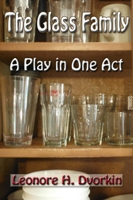The Glass Family
A Play in One Act
by Leonore H. Dvorkin

Click on the image to see a larger version.
A play in one act, in which the transparent characters — Glenn, Glenda, Gladwin, and Glennis Glass — offer their opinions on such weighty philosophical matters as being half full or half empty, accepting oneself as one comes from the Great Factory, the restricted lives of their costlier neighbors in the locked china cabinet, the fate of an unfortunate cousin with a glass jaw, and much more.
The characters:
Glenn Glass, the oldest and largest of these vessels. Given that the humans use him to serve beer more than any other beverage, he has overheard many remarks that the speakers draining him considered very witty, and he has come to love puns.
Glenda Glass, Glenn's faithful wife and the only painted one of the four. However, a little paint on the outside does not mean that a glass, or a woman, is useless or vain. As you will see, Glenda thinks very deeply about life, be it inside or outside the cupboard.
Gladwin Glass, the son, a sturdy and inquisitive young chap. His unusual name means "lighthearted friend." He loves hearing about the rough and tumble lives of some of their cousins, a few of whom are now rather the worse for wear.
Glennis Glass, Gladwin's sister, considers herself quite the sophisticate. I think that many human girls go through a similar stage, and some of them never outgrow that. Glennis, of course, will never grow bigger, but if her humans treat her with care, she will age and-we can hope-mature.
GLENNIS:
I think we're much more attractive than those scratched and banged-up plastic glasses next door to us. They hardly shine at all, and they're so — well — plastic! And can you imagine being that garish bright green? It's just too revolting!
GLENDA:
Glennis, dear, acting superior does not become you or any other transparent glass. Perhaps it's not easy being green — or pink or blue. How can you know for sure? And of course they are just as real in their own way as we are in ours. Their basic material is simply different.
GLENN:
Your mother's right, Glennis. We all have to accept ourselves and others as we came from the Great Factory: tall or small, heavy or light, clear or shaded, glass or plastic, ribbed or smooth.
A review of the play on Amazon
The Glass Family dwell, quite fittingly, in a kitchen cabinet. They serve as everyday drinking vessels for a human family; they stand mute and ready during the day, but at night, while the human family sleep, the four of them talk, revealing to the reader that they lead rich and thoughtful lives. They love the hot, soapy baths and polishings after each use; they enjoy the legends passed along by the family elder, Glenn Glass; they have vague memories of their arrival in a packing box; they have fears, careful though their humans are, of being dropped and shattered. There is a social hierarchy among glasses — the Glass family try not to feel superior to their plastic neighbors or inferior to the fancier vessels in the china cabinet nearby — but there is also an abundance of love and good will. And most importantly, wit. But give yourself the pleasure of reading this charming little play for yourself.